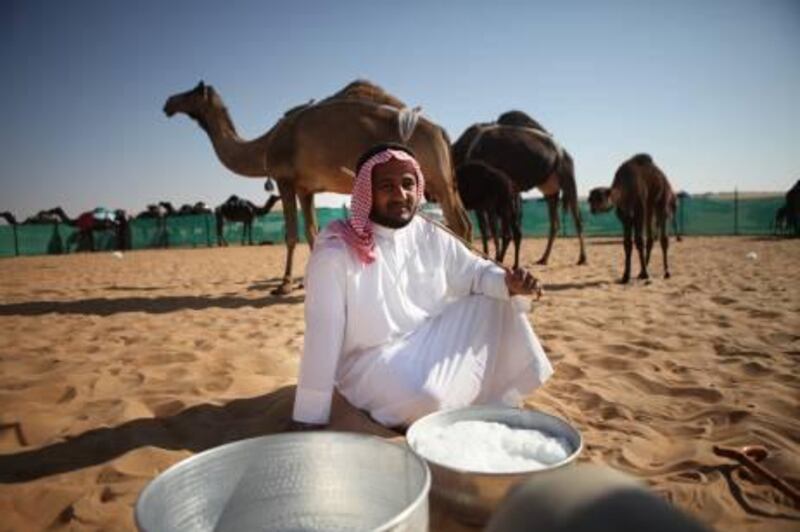A documentary about camel milk that features the UAE will be shown to audiences in London this month at a culinary arts festival.
The 50-minute film Hot Chocolate for Bedouins examines the nutritional benefits of camel milk and how it helps marginalised people in poor countries.
The UAE is one of more than 20 countries featured in the film, which was conceived as a three-month project on camel cheese.
"We found out that, supposedly, camel-milk cheese is impossible to make," said Philippa Young, a UK filmmaker associated with the What Took You So Long Foundation.
But Ms Young and the two members of her team visited a dairy in Mauritania that produces camel-milk cheese, which looks like Brie or Camembert, and discovered otherwise.
In their efforts to tell the story of camel milk, she and her fellow filmmakers, from Sweden and the US, have travelled to much of Asia and some of Africa.
Filming was done in countries including Oman, Qatar, China, Mongolia, Kazakhstan, Kyrgyzstan, Uzbekistan, Morocco, Egypt, India and Kenya.
The team also discovered there is advanced research on the merits of camel milk being conducted in Holland, Sweden and Denmark.
"We have gone wherever we heard a new story and where we felt we should go," said Ms Young, the producer.
The team was attracted to Abu Dhabi because of the annual Al Dhafra Camel Festival and its beauty contest.
Finding the idea curious, they soon changed their minds after looking at the camels on show.
"Camels are beautiful," Ms Young said.
The visit also gave the filmmakers a glimpse into the culture. With limited resources the team members used public transport and carried their own equipment.
After a day of filming at the festival, the team members were hitching to try to find shelter for the night.
Only 30 seconds passed before they were given a ride by a group of Emiratis who offered them shelter at their desert camp.
Despite a language barrier everyone had a great time, dancing around the campfire and drinking tea.
"They were very happy we loved the camels as much as they did," said Ms Young. "We communicated through gestures and a little bit of English.
"I was blown away by it. There was nothing there but just hospitality. This might sound strange to you but you do not get this in other parts of the world."
The crew also filmed at Dubai's Central Veterinary Research Laboratory. An extended version of the film will be finished next year after filming in the US and Pakistan.
Ms Young said promoting the consumption of camel milk could help the UAE preserve its environment.
"The weird thing is that in Saudi Arabia and the UAE, people have their huge farms with cows that are flown from Europe," she said.
Ms Young said cow dairies required a lot of energy as the animals had to be kept cool, but camels were perfectly adjusted to the climate.
"It could be something very proudly Emirati that you can bring to the rest of the world and be appreciated for," she said.
Alexa Perrin, the founder of the Experimental Food Society, which will take part in the festival where the film is screening, agreed.
Mrs Perrin was introduced to camel milk by her mother-in-law, Lilianne Donders, the "camel whisperer" who has lived in the Middle East for more than 30 years and has interacted with camel herders in Oman, Syria and the UAE.
Ms Donders has also trekked in the region with her own small herd of camels. She lives in Oman with her husband, Robert Weener, and her eight camels.
Ms Donders appears in Hot Chocolate for Bedouins after the crew interviewed her in Oman.
Mrs Perrin saw the film when it screened at a conference in May, and decided she wanted it to be part of her festival.
She remembers the first time she was invited to drink camel milk. She hesitated because of her distaste for cow's milk.
"I do not particularly like cow milk but when I was given camel milk I liked it," Mrs Perrin said.
She believes that because of its nutritional benefits - it has high amounts of vitamin C and proteins, and is low in fat - camel milk can fit in with the trend for healthy food in Britain.
"I think it will be very well received," Mrs Perrin said.
The UAE is applying to the EU for permission to export camel milk and products such as chocolates to Europe.
The application, which began six years ago, is in its final stages.





